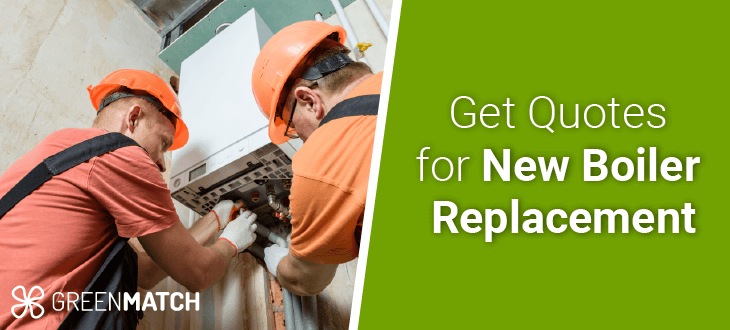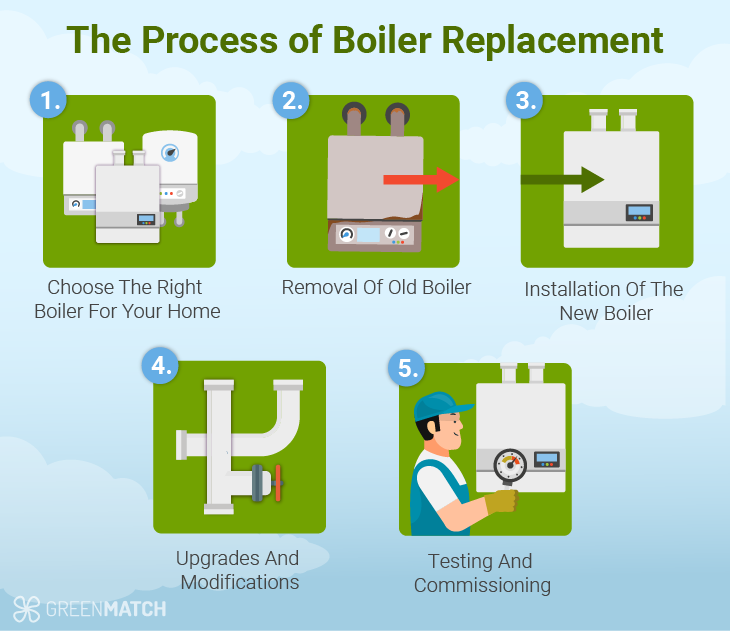Answer these simple questions and we will find you the BEST prices
Which type of solar quotes do you need?
It only takes 30 seconds
100% free with no obligation

Get up to 3 quotes by filling in only 1 quick form

Slash your energy bills by installing an energy efficient boiler

We’ve helped over 500,000 homeowners reduce their carbon footprint
- GreenMatch
- Boilers
- Boiler Replacement
New Boiler Replacement & Installation: Get The Best Quotes


- Replacing a new boiler takes between 4 hours and 2 days
- The price of replacing a boiler starts from £1,500 to £4,000
- Compare quotes to get the best boiler replacement price.
Are you tired of a malfunctioning boiler that doesn't heat your home or provide hot water as it should? Or perhaps you want to upgrade to a more energy-efficient model? Whatever your reason, getting a new boiler replacement and installation can seem daunting, especially when you're on a budget. We will disclose everything you need to know to get the best quote for your new boiler replacement.
So, fear not because, at GreenMatch, we specialise in connecting you with the best quotes for new home boiler replacement and installation. We understand that finding the right boiler replacement or new boiler installations can be overwhelming, which is why we're here to help make the process easy and stress-free for you.
Whether you're looking for the best boilers for your large house or just a boiler replacement, GreenMatch offers a free, no-obligation quote comparison service. This means you can compare the best quotes from different installers and find the one that suits your needs and budget. You don't have to spend hours scouring for the right installer and comparing prices - we do all the work for you.
So, if you're looking for a new boiler replacement and installation, look no further than GreenMatch. Our personalised service and attention to detail ensure you get the best possible experience. Click the button below to receive your free quotes and take the first step towards a warm and comfortable home.
- Quotes from local engineers
- Payment by finance available
- Save up to £975
It only takes 30 seconds



- What happens during a new boiler replacement & installation?
- How long does it take to replace a boiler?
- Different boiler brands to choose from
- How much does a boiler replacement & installation cost?
- When should I get a boiler replacement?
- Boiler replacement grants in the UK
- Get up to 3 free quotes for replacing your boiler
- FAQ
What happens during a new boiler replacement & installation?
Replacing an old boiler with a new one is a significant investment, but it may enhance your home's energy efficiency and save you money on your energy costs. If you're considering a new boiler replacement and installation, here's what you can expect:

1. Choose the right boiler for your home
Before the installation process begins, you'll need to choose the right boiler for your home. This can depend on factors such as the size of your home, the number of occupants, and your heating and hot water needs. These factors all impact how powerful your boiler should be so it's important to carefully consider what size boiler you need. Also, you should research the best boiler manufacturers to find a reliable boiler model for your home.
A qualified installer can help you choose the right boiler for your home and provide you with advice on the different types of boilers available. And GreenMatch got you covered for getting the best boiler offers for your home.
2. Removal of old boiler
The first stage in the installation process is to remove your old boiler. This can involve draining your heating system and disconnecting your old boiler from the gas and electricity supply.
3. Installation of the new boiler
Once the old boiler has been removed, the new boiler will be installed in its place. This will involve connecting the new boiler to your heating and hot water system and ensuring it's properly installed and commissioned.
4. Upgrades and modifications
If necessary, your installer may need to upgrade or modify your heating and hot water system to accommodate the new boiler. This can include replacing old pipes or radiators, upgrading your hot water cylinder, or installing new controls and thermostats.
5. Testing and commissioning
Once the installation is concluded, your installer will test and commission your new boiler to ensure it works properly and efficiently. They'll also provide information on how to use your new boiler and maintain it.
How long does it take to replace a boiler?
Replacing a boiler can take between 4 hours and 2 days. Typically, the time required depends on the following factors: the type of installation, the complexity of the job, and additional work if need be.
The projected timeframes for various installations are as follows:
| Service | Estimated time needed |
|---|---|
| Straight boiler swap | 4-6 hours |
| Boiler relocation | 1-2 days |
| Installing a brand-new combi boiler | 1-2 days |
| Switching the type of boiler | 1-2 days |
Remember that your particular housing situation and circumstances might extend or shorten the boiler replacement process. It's highly recommended to consult a heating engineer to find out an accurate timeframe for your situation.
Different boiler brands to choose from

Your home's ease of living and energy efficiency can significantly change if you choose the proper brand and kind of boiler. With so many options, it might be difficult to decide which brand or model to buy. Here is a brief overview of the different boiler brands to consider:
1. Worcester Bosch - Worcester Bosch is a leading boiler brand known for its high-quality products and excellent customer service. They offer a wide range of boilers, including combi, system, and regular boilers, suitable for homes of all sizes. Worcester Bosch boilers are reliable, energy-efficient, and have long warranties, making them a popular choice for homeowners.
2. Vaillant - Vaillant is another leading boiler brand known for its energy-efficient products and excellent customer service. They offer a range of boilers, including combi, system, and regular boilers, designed to meet modern homes' heating and hot water demands. Vaillant boilers are easy to install and maintain and come with long warranties, providing homeowners with peace of mind.
3. Baxi - Baxi is a well-established boiler brand with a reputation for producing reliable and energy-efficient boilers. They offer a range of boilers, including combi, system, and regular boilers, suitable for homes of all sizes. Baxi boilers are easy to install and maintain and come with long warranties, making them a popular choice for homeowners.
4. Ideal - Ideal is a popular boiler brand known for producing affordable and energy-efficient boilers. They offer a range of boilers, including combi, system, and regular boilers, designed to meet modern homes' heating and hot water demands. Ideal boilers are easy to install and maintain and come with long warranties, providing homeowners with peace of mind.
5. Viessmann - Viessmann is a German-based boiler brand producing high-quality, energy-efficient boilers. They offer a range of boilers, including combi, system, and regular boilers, suitable for homes of all sizes. Viessmann boilers are easy to install and maintain and come with long warranties, making them a popular choice for homeowners.
Types of boilers and fuels
It's also crucial to consider the type of boiler and fuel source that's best for your home. Here are the most common types of boilers and fuels:
Boiler types
- Combi Boilers - Combi boilers provide both heating and hot water in a single unit, making them a popular choice for modern homes with limited space.
- System Boilers - System boilers work with a hot water cylinder to provide heating and hot water, making them a popular choice for homes with multiple bathrooms.
-
Regular Boilers - Also known as conventional boilers, regular boilers are one of the oldest and most established types of boilers on the market. Regular boilers heat water and store it in a hot water cylinder, which can then be used to provide hot water for taps and showers. The hot water cylinder is often located in an airing cupboard or loft space.
Regular boilers are particularly suitable for homes with more than one bathroom, as they can provide large quantities of hot water at once. They are also well-suited to properties with older heating systems, such as radiators requiring high water temperatures.
Boiler fuels

Gas

LPG

Oil

Electricity

Biomass
- Gas - Gas boilers are the most common type of boiler in the UK, as they're easy to install and provide reliable and efficient heating and hot water.
- LPG - Liquefied petroleum gas (LPG) is a popular fuel for boilers because it is clean-burning and relatively inexpensive. It comprises propane and butane gases and is stored in pressurised containers. LPG is commonly used in homes, businesses, and industries as a fuel for heating and cooking.
- Oil - Oil boilers are a popular choice for homes without access to gas, as they provide reliable and efficient heating and hot water.
- Electricity - Electricity is a versatile and convenient fuel source for boilers. Electric boilers are popular in homes and businesses without natural gas or LPG access. Electric boilers work by heating water using electricity, which is then circulated through the heating system.
- Biomass - Biomass is a renewable fuel source comprising organic materials such as wood chips, sawdust, and agricultural waste. Biomass can be burned to produce heat for boilers, making it an environmentally friendly alternative to fossil fuels.
So, are you now looking for the perfect boiler brand but feeling lost in the sea of options? We can help you! Our service at GreenMatch is the ultimate solution for finding the best boiler brand that suits your needs.
We understand that choosing the right boiler brand can be confusing, so we offer our expertise to connect you with professional installers in your area. All you need to do is fill in our 30-second form and receive up to 3 personalised quote within minutes. The best part? Our service is free, and you are not obligated to acknowledge any of the quotes you receive.
Our service allows you to compare the best deals for your home boiler at your own pace. If you're curious about the best boiler brand prices, simply click the button below to get started.
- Quotes from local engineers
- Payment by finance available
- Save up to £975
It only takes 30 seconds



How much does a boiler replacement & installation cost?
The boiler replacement cost and installation can be a significant investment on top of what you'll pay for the new boiler itself. It is essential to understand all the variables affecting the final price. In the UK, the cost of a new boiler replacement and installation can vary depending on various factors, including the boiler's type and size, the installation's complexity, and the property's location.
On average, a new boiler installation cost in the UK can range from £1,500 to £4,000, including the cost of the boiler itself, installation fees, and any additional work required. However, it is necessary to note that these costs can vary significantly depending on the boiler type and the installation requirements.
For instance, a straightforward combi boiler replacement with a new model could cost around £1,500 to £2,750. In this case, the combi boiler installation will not require too much time or effort.
In contrast, a more complex system boiler installation with additional components such as hot water tanks, new radiators, and pipe upgrades could cost up to £3,000 or more.
It is always advisable to get a quote from GreenMatch to understand the specific costs involved in your boiler deals UK installation. Additionally, many boiler providers offer financing options and promotions to help spread the cost of new boiler installations.
When should I get a boiler replacement?
Boilers are essential to any home, providing heat and hot water throughout the year. However, like all appliances, boilers have a lifespan and may need to be replaced after a certain period. Here are some signs that it may be time to consider a boiler replacement:
- Age: Most boilers have a lifespan of around 15 years. If your boiler is approaching or over this age, consider a replacement.
- Frequent breakdowns: If your boiler is breaking down frequently, requiring repairs, it may be a sign that it is reaching the end of its lifespan.
- Rising energy bills: An inefficient boiler can lead to higher energy bills. If you observe a significant rise in your energy costs without any other reason, think about switching to a more efficient boiler.
- Uneven heating: If your home is experiencing uneven heating, with some rooms being warmer than others, it could indicate that your boiler is struggling to distribute heat evenly.
- Yellow flame: A yellow flame on your boiler's burner could indicate that it is not burning efficiently and may produce harmful carbon monoxide. This is a serious safety concern and requires immediate attention.
To ensure your safety, if you detect the gas smell or suspect an emergency situation, please promptly contact the gas emergency helpline at 0800 111 999. Your safety is our priority.

If you detect any of these signs, it is essential to consider a boiler replacement to ensure the safety and comfort of your home. At GreenMatch, we are dedicated to providing you with the best quotes for a new boiler replacement.
Our service is designed to be fast, efficient, and completely free without purchasing obligations. By utilising our service, you will be connected with a professional installer in your local area who will provide you with the best possible solution.
Gone are the days of wasting time searching for the best deals online or calling installers individually. At GreenMatch, we simplify the process by allowing you to fill out a simple form to receive a quote. To get started, click the button below and let us help you find the perfect solution for your needs.
- Quotes from local engineers
- Payment by finance available
- Save up to £975
It only takes 30 seconds



Boiler replacement grants in the UK
If you're looking to replace your boiler, it's worth knowing that government boiler grants in the UK can help finance your new boiler cost. The main grant available is the Energy Company Obligation (ECO) scheme, which offers financial assistance to low-income households and those in vulnerable situations to help replace their boilers.
The grant covers some of the costs of replacing your old, inefficient boiler with a new, energy-efficient one. Additionally, there are other grants and schemes available, such as the Green Homes Grant, which offers up to £5,000 towards energy-efficient improvements, including boiler replacements.
To know more about the boiler replacement allowance, the different grants available, and new boiler costs in the UK, it's worth checking our qualified installer who can coach you through the process.
Get up to 3 free quotes for replacing your boiler
Regarding the reliable and cost-effective way to replace your old boiler, you have no better option than Greenmatch. Our service is designed to connect you with licensed installers in your area and provide you with up to 3 free quotes for replacing your boiler.
With our network of professional installers, you can be confident that you will receive high-quality service and competitive pricing. Our installers will provide itemised quotes based on your home's specifications, so you can choose the best option for your needs and budget.
Say goodbye to the pain of spending countless hours searching for "boiler installation near me" and comparing quotes from different companies without getting the best result or cheap boiler deals. Let Greenmatch do the work for you and help you find the best deal for your new boiler installation in your area.
Just click the button below to get started and obtain your free quotations right now.
- Quotes from local engineers
- Payment by finance available
- Save up to £975
It only takes 30 seconds



FAQ about boiler replacement in the UK
The time required for a boiler installation depends on several factors, such as the type of boiler, the installation’s complexity, and the property’s size. In general, a typical boiler installation takes between 1-3 days.
You may need to replace your boiler if it is old, inefficient, or frequently breaking down. Unusual boiler noises, a sudden rise in energy costs, and inconsistent warmth in your home indicate that it’s time to repair the boiler.
In the UK, installing your boiler is illegal unless you are a Gas Safe registered engineer. Boiler installation is a complex process that requires specialised skills and knowledge, so it is essential to seek the services of a qualified professional.
The steps involved in installing a boiler depend on the boiler type and the installation’s complexity.
The process generally involves assessing the property’s heating needs, removing the old boiler, installing the new boiler, connecting the gas and water supply, and testing the system to ensure it functions correctly. Getting a quote from GreenMatch and hiring our professional engineer who can handle the process and ensure your safety is essential.

Kathleen was a highly skilled copywriter employed by GreenMatch, with extensive experience in the areas of SEO, email copy, and technical writing. Her professional background includes several years of involvement in research, analysis, and content creation. With a strong emphasis on SEO, Kathleen excels in developing well-researched and comprehensive content for businesses across various niches.
We strive to connect our customers with the right product and supplier. Would you like to be part of GreenMatch?

- New Boiler Replacement & Installation: Get The Best Quotes
- What happens during a new boiler replacement & installation?
- How long does it take to replace a boiler?
- Different boiler brands to choose from
- How much does a boiler replacement & installation cost?
- When should I get a boiler replacement?
- Boiler replacement grants in the UK
- Get up to 3 free quotes for replacing your boiler
- FAQ



